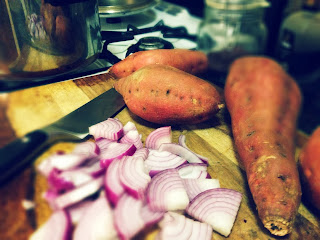Even though it is 80 degrees
in New York, it’s officially fall. While I’m in no rush for the winter weather
to arrive, I am excited that root veggies are officially back on the menu! This
dish has it all: nutrient dense, easy to make (one pan only), a great taste,
and it’s incredibly filling. Making it perfect for any fall evening -even warm ones!
Between the brown rice, the
beans, and the sweet potato this dish is heavily starched-based. But don’t
worry, contrary to what the Aitken’s type diets claim, neither starches nor
carbohydrates make you fat. This is due to the way our bodies process
carbohydrates. While many argue that starches are converted into simple sugars and
then stored as fat by the body; that is not how it actually works.
First it is important to note,
that unlike fats which has 9 calories per gram, carbohydrates contain only 4 calories per gram. This means you will feel physically full with less calories. Basically this means starches have a low calorie density but a high
satiety value per calorie.
After eating complex
carbohydrates like potatoes or beans, our bodies break these carbs down into
simple sugars. These sugars are absorbed into the blood stream, where they are
transported to our cells and used for energy. When you consume more
carbohydrate than your body needs to furnish it with energy, the body stores
around 2 lbs of it, in the form of glycogen, invisibly in the muscles and liver
as a reserve. Any remaining
carbohydrates are typically burned off as body heat rather than stored as fat.
This is because humans are very inefficient at turning sugars into fat, a
process known as de novo lipogenesis.
Even simple sugars are rarely turned into fat. For example, a study found that
both trim and obese women fed 50 percent more calories than they usually ate in
a day, along with an extra 3 ½ ounces of refined sugar, produced less than 4 grams of fat daily. That means
it would take nearly 4 months of this overeating for a person to gain 1 pound
of fat. In comparison, the average passenger on a cruise ship, dinning on high
fat and protein animal foods, gain an average of 8 lbs on a 7-day trip.
Fun
facts about Sweet Potatoes:
- Sweet potato and potatoes are two of the only foods that can fulfill all of our nutrient needs meaning they have all the protein, fats, and carbohydrates our bodies need to thrive (with the exception of some micronutrients).
- George Washington grew sweet potatoes on his farm at Mount Vernon.
- George Washington Carver developed over 118 products from sweet potatoes including a glue and starch for laundry.
- They are loaded with vitamins A, C and E as well as other antioxidants that can help prevent heart disease and cancer, bolster the immune system, and even slow aging by promoting good vision and healthy skin. They have been recently reclassified as an "antidiabetic" food and they are anti-inflammatory.
African
Sweet Potato Stew:
Serves 3-4
4-5
medium sized sweet potatoes
2
carrots diced
1½ cups brown rice
1½ cups of corn
1
red onion-chopped
1
can garbanzo beans
1
can pinto beans
1
large can chopped tomatoes
½
cup almond, peanut, or sunflower butter (I used almond)
1
tablespoon ground ginger
1
tablespoon ground garlic
1
teaspoon ground cumin
1
teaspoon ground coriander
In
a large pot, sauté the chopped red onion in 2 tablespoons of water until the
onions are translucent.
Add
the sweet potatoes, veggie broth and spices and cover for 10 minutes to get the
veggie broth hot. As the broth begins to boil, add the remaining ingredients
with the exception of the almond/peanut/sunflower butter, the corn, and the
collard greens.
Cook
for 15 minutes at a simmer. As the sweet potatoes start to soften, add the
remaining ingredients and cook for an additional 10 minutes until the greens
are soft.
Further
reading:
McDevitt,
R.M. et all., “De novo lipogenesis during controlled over-feeding with sucrose
or glucose in lean and obese women.” American
Journal of Clinical Nutrition. 2001.
McDougall,
John A. and Mary McDougall, The Starch
Solution: Eat the Foods You Loce, Regain Your Health, and Lose the Weight
for Good. New York: Rodal, 2012.
As always the information presented in this blog is for educational purposes only. It should not be considered as specific medical, nutritional, lifestyle, or other health-related advice.



Nice photos! I need more sweet potatoes in my life. Whatcha think of Japanese yams and purple potatoes?
ReplyDeleteThanks Bean! I've been working on my photography skills!
DeleteI love both yams and purple potatoes. I think either would be good in this dish!
I'll be subbing kale for collards FOR THE RECORD.
ReplyDeleteLooks good. Thing I'll bookmark it for when it gets a bit cooler out.
ReplyDeleteThanks to my sister-in-law for pointing out the error.
ReplyDelete